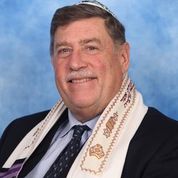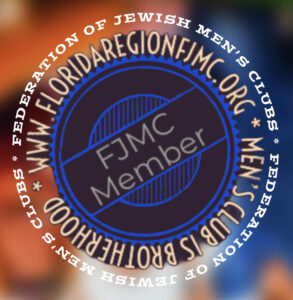
- A second day of Day Rosh Hashanah 5784 sermon from Rabbi Michael Klein
“As an undergraduate student at University of Miami who was also attending Yeshiva classes at the Rabbinic Institute in Miami Beach I used to walk through the student union where tables were set up representing different organizations and clubs for students to join. Among those were Hare Krishna, Jews for Jesus, and at a table in the back area a group of observant Jews who asked all those who passed by if they had put on Tefillin that day. I was very proud each day to roll up my sleeve and show them the imprints of the Tefillin still on my arm.
Also, during our recent pilgrimage to Israel with our Temple Torat Emet group, friends who now feel like family, one of the most meaningful events was the tour of the model of Old Jerusalem and the 2nd Temple of King Herod’s construction. We have been to Israel at least 25 times over the years, but for some reason, this tour, with our Madrich, David, left a very deep impression. He described, in detail, where pilgrims entered to offer sacrifices and where the wealthy Pharisees, and working class Sadducees lived and how Jerusalem was walled on every side except on the north. He also described the history of Roman rule at the time and how violent, corrupt, immoral, and unjust the Roman governance was and how bitterly people complained under the boot of the Roman Empire. It is no wonder, he said, that so many splinter Jewish groups were present- many who escaped the harsh Jerusalem environment such as the Essenes – writers of the Dead Sea Scrolls- who lived monastically in the desert and many groups that were overtly rebellious against Roman rule. Many were brutally murdered as traitors against the governor and the Caesars by crucifixion and hanging. Many longed for the hoped for redeemer who would bring and end to the suffering and bring about G-d’s Kingdom on earth.
It was in this turbulent maelstrom of events that a simple Jewish man from Nazareth, who lived his life as an observant Jew, began to preach and apparently had many followers who were attuned to his messages of the rewards of belief and practice in the world to come. While not openly preaching rebellion against Roman rule, many, especially those among the wealthy and ruling classes, began to take note of his popularity and labeled him as subversive, seeking to end his role as preacher and teacher. He was subsequently brought to public trial by Pontius Pilate and crucified as well along with many of his followers, as was the Roman custom for publicly challenging Roman rule. It is here that the theology and historical facts become murky.
About the same time as our visit to Israel, I happened to be reading a new book by Zeev Farber called “Why Jews are not Christians” which frames many of the distinctions between Judaism and Christianity from ancient origins to today. I also was rereading Milton Steinberg’s seminal text, “Basic Judaism” which also emphasizes some of the major tenets of Jewish ethics. Against the backdrop of our visit to Jerusalem, I began to crystallize some of the ideas contained in my sermon today!
Most biblical scholars accept that Jesus lived his life as an observant Jew and never rejected Jewish Law. Yet, in the New Testament, written mostly hundreds of years after his death, Jesus is purported to have rejected observance of the Shabbat and Laws of Kashrut and is purported to have said that attainment of heaven could only occur with belief in him as son of G-d and Messiah. Further, many of the homilies which are recorded in Jesus’ name are reiterations and reformulations of sayings from the Tanakh and the Talmud.

Many of the concepts espoused by his disciples including the virgin birth and the Trinity are totally contrary to Jewish beliefs and some are even based on incorrect translations of prophetic words of Isaiah from Hebrew to Greek in the Septuagint and Roman Vulgate Bibles. That G-d could exist in human form and the bowing and genuflecting in front of an object such as a cross are totally contrary to Judaic beliefs and even are considered Avoda Zara – idol worship. Additionally, the concept of Messiah in Judaism has been totally transformed by Christian scholars into a form which is contrary to its original prophetic context. The concept of Messiah,( in Hebrew Moshiach) was a term which was reserved for anointed Kings- the anointing accomplished by pouring a small amount of purely prepared olive oil on the King’s head as a symbol of holiness. It is only in more modern times, especially among Kabbalistic and Chassidic Jews that this term takes on the aura of a messenger who will announce the great ushering of the time of G-d’s Kingdom on earth.
The most difficult aspect of the relationship between Judaism and Christianity is the intolerance and persecution perpetrated on Jews and Jewish Communities by leaders of Christian ideology throughout the ages none more insidious than the complicity of the Catholic Church during the Crusades, the Inquisition, and the Holocaust.
What do we take away from this? Many biblical scholars agree. Judaism would still exist without Christianity but Christianity and Islam would have never come into being without Judaism. As long as Christians accept this and acknowledge the important role that Judaism plays in “Christian history and ethics” then there can be mutual respect and cooperation. When Christian leaders make comments such as, “G-d does not hear the prayers of a Jew”, no such respect is evident. The ethics of Christianity is belief based and places great emphasis on the redemption of mankind of the “Savior” for the original sin of Adam and Eve in the Garden of Eden. The preeminence of Satan as an evil opponent to G-d and Savior and that man is essentially evil are crucial to the theology of Christianity.
Judaism is action based and places less emphasis on belief. Jewish theology views human as having a Yetzer Tov and Yetzer Hara (Good and Evil Inclinations) and unlike Christianity does not view humankind as inherently good or evil. Judaism is much more accepting of the possibility of righteous non-Jews who live a moral and ethical life and adhere to the seven Noahide laws. Jews are taught to respect but not follow Christian ethics or observance whose traditions are largely contrary to Jewish law.
Ultimately, it is for us to learn as much of the Torah , perform as many of the traditions and Mitzvot as possible, teach our children by word and example the Jewish life and take pride in the fact that Judaism has imparted to the world most of the basis of Law and ethics which have been the basis of modern society for more than 2 millennia.“
Rabbi Michael D. Klein attended Yeshiva College of South Florida and served as Torah Reader, Hebrew teacher, Chazzan and spiritual leader of various synagogues throughout South Florida. In January 2015 he became Ritual Director, Bnai/Bnot Mitzvah instructor and 7th grade Hebrew instructor for Temple Torat Emet of Boynton Beach. In October 2019 he was accepted into an accelerated track at Yeshiva/Mesifta Adas Wolkowisk, completed his Rabbinical studies in July 2020 and has been the Rabbinic leadership of Temple Torat Emet since August 2020. In September of 2022 he was appointed Rabbinic and Spiritual Advisor of the Florida Region of FJMC.
This message is brought to you by the Florida Region of the Federation of Jewish Men’s Clubs. We are part of a confederation of over 200 Jewish Men’s Clubs and Brotherhoods representing over 20,000 members across the United States, Canada, Latin America, Mumbai, India and beyond. Learn more about how your Jewish Men’s Club or Brotherhood can affiliate with the FJMC at: https://www.fjmc.org/content/affiliating-fjmc.
The Florida Region of the FJMC serves the needs of affiliated Men’s Clubs and Brotherhoods throughout the State of Florida. Get to know more about the Florida Region of FJMC and our growing network of dynamic Jewish Men’s Clubs and Brotherhoods on our website www.FloridaRegionFJMC.org and please visit and LIKE our Facebook Group at www.facebook.com/FloridaRegionFJMC.







